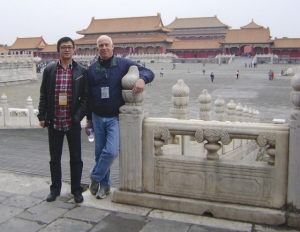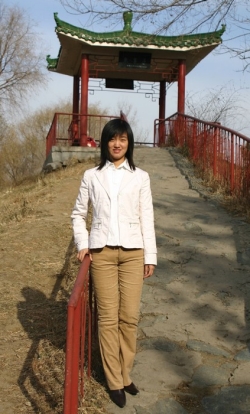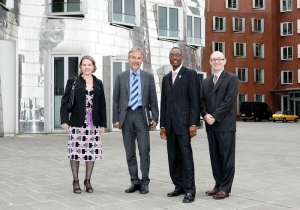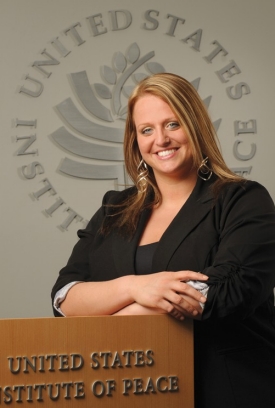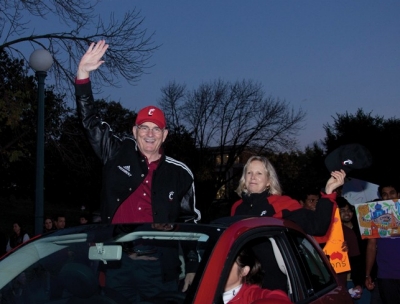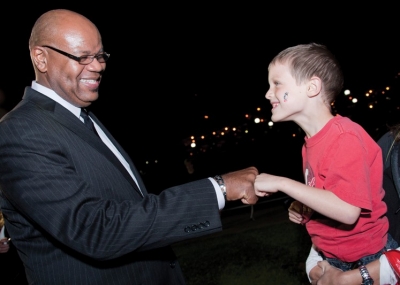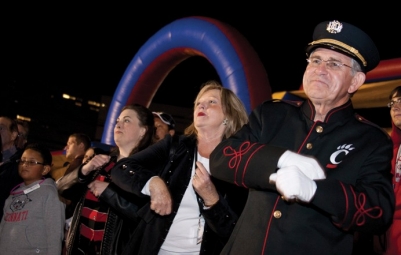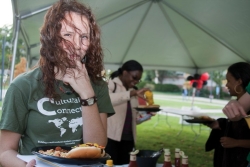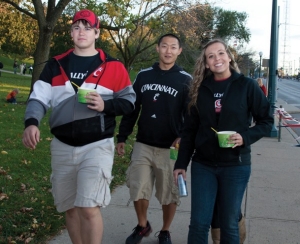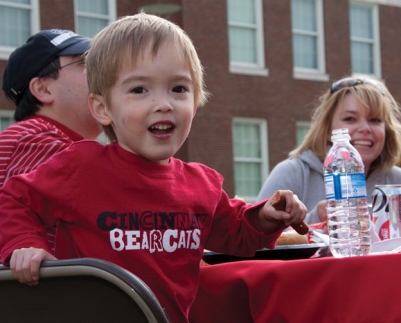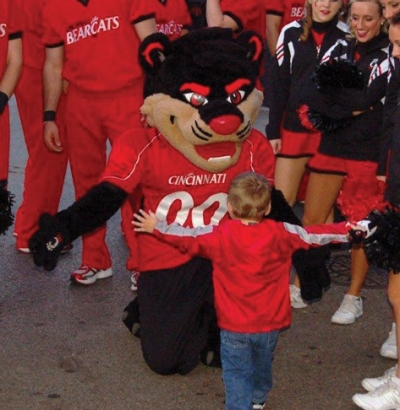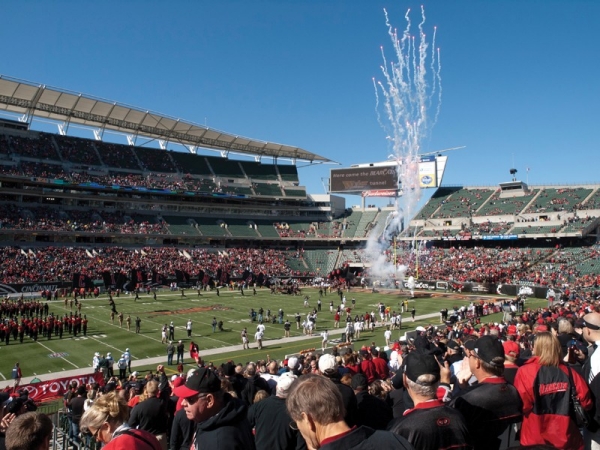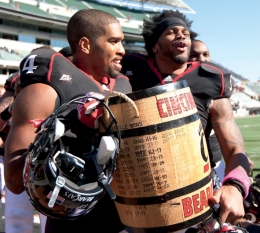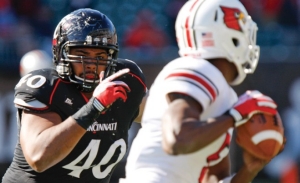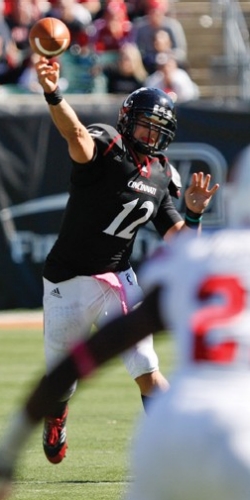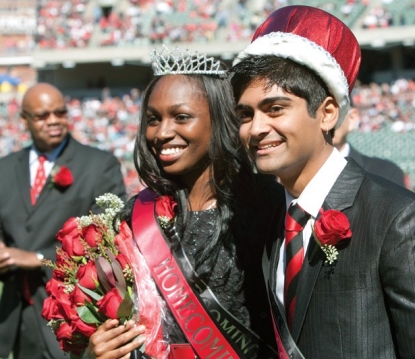Jump to:
UC grads help define 'international university'
Graduate helps ensure safety in Iraq
Revisit Homecoming 2011
Alumni Connection
As UC's stature as an "international university" continues to grow, alumni not only benefit from that reputation, but they also help the university further its reputation.
For Scott Simmers, Eng '83, UC's global co-op program offered transformational opportunities abroad. His co-op experience led directly to a successful corporate career in which he travels the globe for Ashland Inc., based near Columbus, Ohio.
For China native Yu Yin, Bus '10, the term "international university" describes a welcoming, open-minded, second home for students and faculty from around the world. In earning a master's degree here, she considered her experience "fantastic and fulfilling," paving the way to a career in tax accounting.
And for Neil Hensley, A&S '84, the phrase involves the substantial, yet perhaps underappreciated, role the university has in attracting international companies to the region. Hensley's UC education served as a springboard for a lengthy career as the premier recruiter of foreign investment to Cincinnati.
Scott Simmers
Scott Simmers has been with Ashland since his co-op assignments from 1979-82. After graduation, he went to work for the specialty chemical company, rising to his current position as director of global engineering solutions.
"My department is in charge of all Ashland global capital projects over $1 million," he says. "I travel where we're doing projects, as well as other Ashland locations, to help plants understand Ashland engineering standards and the help we can provide."
Simmers has maintained a continuous connection to UC's cooperative education program throughout his career -- supervising co-op workers, previously leading the company-wide co-op program and hiring UC students for co-op jobs, as well as UC grads for full-time positions. "UC provides a very practical-based engineering program, which is what we need at Ashland," he says.
The institutionalized integration of UC into Ashland's operations underscores the "international university" description. Ashland operates in more than 100 countries on every continent, so Simmers' bags are nearly always packed, often traveling with a few fellow Ashland Bearcats.
"Normally each year, I travel to China three times, Europe twice and Brazil once," he says. "And I'll need to go to places like Australia or India in the future. I've seen parts of the world that, back in the early 1980s, I never would have thought I'd see."
Simmers also views UC, the co-op program and its global possibilities through the eyes of a parent. His son, Phil, is a senior biomedical engineering major, and Scott is amazed and proud of how UC has evolved in just one generation of the Simmers family.
"I talk to many parents from the Columbus area who come back and rave about the campus," he says. "When I attended UC, it was a concrete campus nicknamed 'Under Construction.' It's not that way now.
"And athletics are so much better now than the early '80s. Our Columbus group has football season tickets and attends bowl games each year.
"Plus UC's academic reputation is ever increasing. The university is working hard on that. It's important to the worldwide reputation of its graduates that UC is considered a leader in many fields like DAAP, engineering, CCM and criminal justice."
When Phil was about to enroll at UC, Scott took him to a central Ohio "Summer Sendoff," in which incoming UC freshmen and their families gather to get acquainted. Feeling the event warranted more than the 20 or so people who attended, Simmers offered to become the project's volunteer leader, working in concert with the UC Alumni Association, which coordinates the events. Just four years later, last year's Summer Sendoff drew 130 and was hosted at Ashland's corporate offices, based in Dublin, Ohio.
The Sendoff efforts dovetail with his co-leadership of an annual Central Ohio UC golf-outing fundraiser and his service on the Proudly Cincinnati Campaign Committee for Columbus. "I find great positive feedback in helping UC in this area, and I've seen a great deal of increased awareness of the university in this town," he says.
.
Our graduates make a big difference when they let people know where they received their degree. When people walk into my office, there is no question where I graduated from and where my allegiance is.
-- Scott Simmers, Eng '83
Yu Yin
If college is all about igniting your passion in a continually shrinking world, then 2010 graduate Yu Yin's depiction of an international university's free flow of ideas resonates wonderfully.
"UC is a fantastic place to study and chase your dream," she says. "Everyone is friendly and willing to help. They respect the different cultures and perspectives that international students have.
"Yet some of us may not have future sight regarding life after college, or may find themselves in majors that don't suit them, or may be somewhat blind to where certain career paths really go. That's largely because of a lack of familiarity with American culture and society, so I think international students may need more career guidance than others."
She also sees a need for increased social interaction among international and U.S. students alike, which would help promote greater cross-cultural understanding while countering some of the loneliness and distance that exists for those who are studying so far from family.
Initially drawn here by the academic reputation, transformed campus and successful track record with international students, Yin already sees the domino effect created by her "biggest life-changing decision" to attend UC. Approaching her graduation in 2010, she reached out to the UC Alumni Association, which offered her contacts to help her get started as a tax consultant with Deloitte in Cincinnati. She also became a UC Alumni Association board member last year.
"After graduation, I feel more attached to UC than when I was a student," she says. "I think I will stay in Cincinnati for a long time. Thanks to UC's professors, staff and alumni, I'm in my dream job and truly enjoy my life. I also believe that as other international students land their dream jobs here, they'll want to experience life in the U.S. for a while, too."
Neil Hensley
As a German studies major with undergraduate work/study experience overseas in the early 1980s, Neil Hensley became the international marketing intern at what was then called the Greater Cincinnati Chamber of Commerce (now the Cincinnati USA Regional Chamber). Nearly three decades later, he is widely known and respected for successfully promoting and marketing Cincinnati around the world as the Chamber's senior director for economic development.
In his regular travels to India, Japan, Germany, France and the United Kingdom, as well as his continual hosting of foreign business leaders when they research Cincinnati in person, UC is a central part of the discussion.
"I talk about the university in almost every prospect meeting I have anywhere in the world," Hensley says. "UC is a major asset that we actively market to companies thinking about establishing a presence here. Every company needs employees, and UC is a major pipeline for talent, especially in such areas as engineering, design, medicine, life sciences and general sciences.
"I get asked all the time about the number of chemical engineers, software engineers, pharmacists and brand/package-design people we're graduating. Most of my clients have heard of UC, or they expect a major city like ours to have a major university.
"But they really aren't aware of the variety or exceptional quality of our programs -- better than some of the U.S. schools that are known by everyone worldwide. They're also surprised to learn of UC's size.
"These are important 'proof points' for decision makers who are considering relocating or expanding to Cincinnati," he adds. "And these people appreciate that we produce the talent they'll need to successfully do business here."
Although the term "international university" usually conjures images of foreign students coming to Cincinnati and American students being educated abroad, Hensley feels the term also refers to plentiful research cooperation between UC and institutions outside the U.S.
"Recently I was working with a German company called Forcam, one of many multinational companies -- including Toyota, Toshiba, Boeing, Bosch and others -- that participate with UC's Center for Intelligent Maintenance Systems out of the College of Engineering and Applied Science," he says. "The center is involved in technology that helps predict when automated machinery may need repair or replacing, so it can add tremendously to business efficiency."
When Forcam wanted to establish a U.S. presence, the company president had already been to Cincinnati and UC many times to meet with center director Jay Lee on their research. Hensley says it became natural for the company to consider and ultimately choose Cincinnati for their first American office, which is set to open early this year.
"If UC didn't have a Center for Intelligent Maintenance Systems, Forcam likely wouldn't have looked closely at Cincinnati for their expansion," he says. "We see the same things happening elsewhere in the university.
"For example, as the region grows its life-science-industry cluster and seeks more companies in that field, we can similarly leverage the work being done at UC's medical and pharmacy schools, the Vontz Center for Molecular Studies and the Metabolic Diseases Institute at UC's Reading Campus."
Hensley does a lot of work recruiting companies in the aerospace sector, so he's introduced many prospects to Awatef Hamed, the director of UC's Aerospace Systems School.
"It's interesting for foreign prospects to see an Egyptian woman heading up an aerospace engineering program at UC," he says. "Meeting Dr. Hamed brings a heightened appreciation to our academic and research excellence, our diversity and the global aspect of our region and university."
The United States celebrated a significant achievement on Dec. 31, 2011, when the final combat forces remaining in Iraq handed over security to the Iraqi government and withdrew from the country. Despite the relatively quiet end to the nine-year conflict, which resulted in the ouster of Saddam Hussein and the creation of a new Iraqi-elected government, the fight for a stable Iraq is still far from over.
Tensions between Sunni, Shiite and Kurdish groups -- along with corruption and daily violence -- threaten to pull the country toward chaos, worries a UC alumna in the middle of it all. Furthermore, Iraq's infrastructure and services such as garbage collection, transit and electricity still are not back to pre-war operations. Adding to these challenges is concern that without the buffer of U.S. security forces, it will be even more difficult to reconcile and unite the country.
While the barriers are significant, the promise of a better future is what keeps Joyce Kasee, A&S '07, going full speed. As a member of the United States Institute of Peace (USIP), Kasee works closely with the U.S. State Department and Iraqis to build the capacity of Iraqis to mitigate conflict in their own communities with an emphasis on reaching out to women, youth and minorities.
"It's amazing to work with people who have never had a voice like this before," she says. "As Americans, we take it for granted that we can organize freely and express our concerns or opinions without violent repercussions for such actions. But in Iraq, citizens are only beginning to discover their freedom and ability to impact change within their communities. So it takes time to help them organize and create a caucus -- or teach them about other basic tenets of representative government -- because most of Iraqi citizens have been unable to participate until now."
Improving the lives of others is what motivated Kasee to pursue a degree in international affairs with a focus on human rights. Internships in London and Europe, as well as a language-immersion program in Egypt during her senior year, led to an assignment addressing reconciliation in post-genocide Rwanda. Most recently, she joined USIP, which has given her the chance to work in Iraq for the past year.
Aside from her work on behalf of underrepresented groups, Kasee oversees 18 Iraqi "grantees" from different parts of the country who mediate conflict, educate citizens and promote peace at the grassroots level. Grantees often relay problems faced by citizens in their jurisdictions, which Kasee takes to State Department colleagues. Many of the grantees are younger than 30 years old and have never experienced the level of freedom they do today.
"My colleagues and I are especially motivated by the young people we work with," she says. "There is a generation here that has never experienced stability, having been born under the Saddam Hussein regime, then living for years in conflict during the war.
"Most of them have loved ones who have been killed, and they still face the threat of violence themselves. But they are hopeful it will soon get better and want to be a part of building a new country. It's exciting to see so many people willing to help despite how hard the war has been on them and their families."
This work is even more vital now that the U.S. Armed Forces have left the country. Although she's thankful that U.S. soldiers are out of the line of fire, Kasee worries some may consider the end of combat operations to mean the country no longer needs assistance.
"We feel a deep sense of gratitude to the soldiers who served here and realize many people gave their lives in this conflict," she says. "For us, the best way to honor this service is by continuing to build a country that can stand on its own.
"Our mission in Iraq wasn't only tied to military or security success. It was also about conflict stabilization and creating a sustainable peace. We are making progress toward those goals, but we still have a lot of work to do."
Kasee plans to be in Iraq with the USIP for the foreseeable future, as the organization has just finalized a new strategic plan that will require a presence for at least the next five years. While she knows the work is important, she acknowledges it can be challenging not to feel homesick.
But as a proud UC alum, Kasee has found a few ways to bring Cincinnati to Iraq. "I brought all my UC stuff to wear around our base. Even though it's usually hot over there, I try to wear my Bearcats hoodie when possible.
"I also make sure the Bearcats game gets on one of the TVs in the communal area of the local base. I take very seriously the saying, 'Represent the C.'"'
Link:
Distinguished UC alumni to be honored
The UC Distinguished Alumni Award Celebration, formerly known as the UC Day Celebration, is coming up this summer. Please make plans to attend, and keep these awards in mind in considering nominees for next year’s award winners.
UC Distinguished Alumni Award Celebration
June 14, 2012, 6-8 p.m.
Kingsgate Marriott on campus
UC Distinguished Alumni Celebration website
Questions to erin.stanley@uc.edu
William Howard Taft Medal for Notable Achievement -- presented to a university alumnus solely on the basis of significant life achievements in his or her chosen field.
Alumni Distinguished Service Award -- providing recognition to dedicated alumni who have faithfully rendered outstanding service to the University of Cincinnati.
Hurwitz Young Alumni Outstanding Achievement Award -- given to a UC alumnus, 35 or younger, on the basis of significant professional achievement in his or her field of endeavor, as well as continued service and involvement with the university and community.
Alumni Association Mosaic Award -- presented to an alumnus who has demonstrated leadership while enhancing our shared community through cultivating collaboration, fostering inclusiveness, championing the cause of the underrepresented and promoting greater equity and opportunity for others.
Uptown Friday, Downtown Saturday
UC tried a new approach to Homecoming Oct. 14-15 by celebrating uptown with a parade and pep rally Friday evening and downtown at Paul Brown Stadium Saturday afternoon. Thousands lined the streets for the Friday parade, then made their way over to the pep rally on Campus Green. The next day the Bearcats responded with 25-16 win over Louisville to retain the rivalry’s coveted Keg of Nails trophy for the fourth straight year.
.
UC Alumni Association President Myron Hughes, Bus '86, fist bumps a young Bearcat during the Friday night pep rally, emceed by radio color analyst Jim Kelly Jr., A&S '75. Photo/Dottie Stover
.
Band director Terren Frenz and his wife, Debra, A&S '10, help lead fans during the Homecoming pep rally. Photo/Dottie Stover
.
At right and below, UC students and young fans
get into the spirit and excitement of Homecoming
week. Photos/Dottie Stover
.
.
Homecoming game 2011 -- UC over Louisville, 25-16
.
.
Meet your 2011 Homecoming King and Queen
Queen Chizi Igwe is president of the Delta Sigma Theta Sorority, internal vice president of the University Funding Board and a member of the Student Alumni Council, CWEST and Sigma Phi Women's Honorary. The finance major was sponsored by the Lambda Society.
King Rohan Hemani is a Lindner Honors-PLUS Scholar, a Darwin Turner Scholar, co-founder and captain of UC's International Dance Team, president of UC's Asian American Association and vice president of Alumni Affairs for the Student Alumni Council. The finance major was sponsored by Sigma Alpha Epsilon.
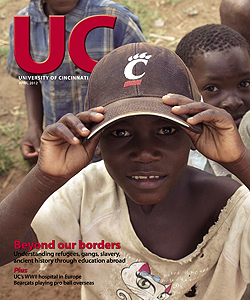
 Past Issues
Past Issues